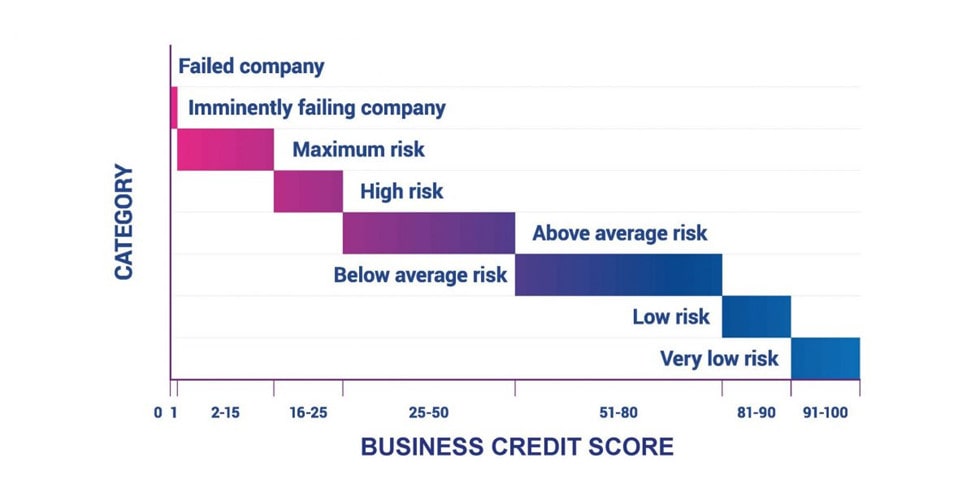
How do I check my business credit score in the UK?

Maintaining a good credit score is an essential part of running a successful business.
Your business credit score represents your company’s creditworthiness. It shows prospective partners, investors and suppliers that you have a good track record of paying your dues on time.
If you’re seeking external financing, such as business loans, or simply want to put your best foot forward, the first step to improving your credit score is to know where you currently stand.
In this article, we’ll help you learn how business credit scores work and what factors affect them. We’ll also answer the question “How do I check my business credit score in the UK?”
How do business credit scores work?
Business credit scores in the UK are generated by credit reporting agencies (CRAs, also called credit bureaus), such as Equifax and Experian. They’re then reported to lenders, suppliers and others who may request your score.
CRAs take into account several things to calculate a business’s credit score. They may look at how long a company has been in operation, whether it has previously defaulted on payments and more.
So, if you’ve been clearing your balances on time and keeping your credit utilisation ratio in check, and your suppliers have reported your good credit behaviour, there’s a higher chance that your business will be deemed creditworthy and acceptable for a loan.
Each business credit rating agency uses a different method to measure and rank your creditworthiness. They use a diverse scoring range to help you (and lenders) judge the quality of your score.
Top Tip: A good business credit score doesn’t happen overnight. Learn how to strengthen your score over time in our guide on everything you need to know about your business credit score 💡
Is my business credit score different from my personal credit score?
It’s important to remember that personal credit scores and business credit scores are different. When your business is new and doesn’t have an established credit history, lenders may investigate your personal credit score to see if you’re creditworthy.
It’s good practice to keep your business transactions separate from personal finances. Having a separate business bank account and business credit card for company use can help mitigate issues when applying for business financing.
Top Tip: A low personal credit score can affect the creditworthiness of a new business and make it difficult to get financing. However, it is possible to build your business credit independently. Learn how to get a business loan with bad credit 💰
What affects my business credit score?
Each CRA has different criteria they look at when determining your score. While there’s no universal standard for business credit scores in the UK, there are common factors that reflect the financial health of your business. A CRA may take any of the following into consideration.
Payment history
Most will look at whether you pay your bills on time. This history includes standard utility bills, but also things like invoices to vendors and your loan repayment history. Prompt payment shows loan providers and investors you’re a good bet.
Public records
County court judgements (CCJs) or insolvency proceedings against your company can have a negative impact on your score. To keep this from happening, resolve any payment disputes quickly, review credit terms before borrowing and build a habit of timely repayment.
Number of credit applications
Too many applications over a short time may indicate that you’re having trouble securing funding for your business. Some CRAs consider these applications as they review your financial history, so be judicious about when you apply.
Filing business accounts on time
At the end of every financial year all companies must file their accounts with Companies House. Doing so in full and on time may boost your score with certain agencies, so it pays to be thorough.
Top Tip: Checking your business credit score in the UK means you need to understand how the UK credit score system works. To learn more about what goes into your company credit report review our guide on the UK credit score system 💷
What is a good business credit score?
Typically, a score in the top 20% of the range is considered a “good business credit score”. The range itself differs depending on the CRA calculating and reporting it.
Here are the business credit reporting scales from two of the top UK CRAs:
Experian business credit scores
Experian’s business credit score ranges from 1–100, where anything above 81 is considered a good score (or low risk).
Here’s a breakdown of Experian’s business credit scores and risk descriptions:

- A business credit score of 0 signifies a “failing company”
- A business credit score of 0–1 signifies an “imminently-failing company”
- A business credit score of 2–15 signifies a “maximum-risk company”
- A business credit score of 16–25 signifies a “high-risk company”
- A business credit score of 25–50 signifies an “above average risk company”
- A business credit score of 51–80 signifies a “below-average risk company”
- A business credit score of 81–90 signifies a “low-risk company”
- A business credit score of 91–100 signifies a “very low-risk company”
Dun & Bradstreet business credit scores
Dun & Bradstreet (D&B) offers several different types of business credit scoring to answer the different questions lenders have around a company’s financial reliability and stability.
Lenders, prospective partners and suppliers may request any of these scores to assess whether to do business with your company.
For example, D&B’s Risk Assessment includes four ratings to help evaluate whether a company is likely to go into bankruptcy, become inactive, cease operations and more:
- D&B Viability Rating
- D&B Failure Score
- D&B Deliquency Predictor Score
- D&B PAYDEX
Top Tip: If you fall into any of the “low” credit score brackets, you’ll need to look for ways to improve your business credit score to secure better loans and rates. Learn how to increase your business credit score 📈
Does the UK use FICO scores?
If you’ve done any searching online for how to check your business credit score, you’ve probably come across FICO scores. FICO is a universal scoring system used in the US. However, in the UK, there is no universal credit scoring system. Instead, lenders request scoring information from their trusted CRAs.
This makes it easier for lenders to get more specific and detailed information related to their purposes. It may also make it a little more difficult for businesses to analyse their score against others in the market.
5 ways to check your business credit score
You can access your business credit score from many CRAs for free. However, some credit scoring companies charge a fee for their report breakdowns or for monitoring credit scores over time.
Here are five ways to check your business credit score online.
1. Experian
Business credit reports generated by Experian offer detailed insight into your business’s financial stability. They can help you better analyse your current position and make more informed business decisions.
Experian’s My Business Profile subscription is ideal for small businesses that are looking to manage their credit scores in real time, as the reports dive deep into what impacts their credit score.
It shows you the top five factors affecting your score. It also includes commercial CAIS data so you can monitor what lenders see while making credit decisions about your business.
Once you sign up with Experian, you can also receive automatic updates regarding any changes to your score.
To sign up for My Business Profile with Experian (or their free three-month trial), you need to be a registered director or owner of the business.
2. Equifax
As we mentioned above, Equifax has a range of reports that give credit information about your business.
Lenders might choose to obtain your credit scoring information from Equifax if they want more specific information. For instance, whether a business is likely to declare bankruptcy soon or is involved in fraudulent activity.
Equifax will also provide you with a statutory business credit report that simplifies the information they hold about your business so it’s easier to understand.
If you are a company secretary, a director of a limited company, a business owner or a partner, you can request your business credit report from Equifax by contacting their team.
3. Creditsafe
Creditsafe has one of the most predictive credit scoring systems in the industry. Insurers favour them for their multinational, comprehensive reports.
If you’re a registered director of your business, you can request your free credit report from Creditsafe. Your business credit report will include:
- Business verification
- Your credit score and maximum recommended credit limits
- Key risk indicators (such as County Court Judgments)
- Company information (such as Directors and shareholders)
Creditsafe works with all types of credit teams, from micro-businesses to SMEs to enterprise organisations. You can also request a customised solution for your business.
4. Credit Passport
Credit Passport is another free service you can use to run a business credit check online.
This platform uses bank data to show how the financial system views you. Credit Passport’s check is considered a soft inquiry and doesn’t hurt your overall credit profile.
All reports generated by Credit Passport are authorised and regulated by the Financial Conduct Authority (FCA). Their rating system is also one of the easiest to understand.
Credit Passport offers a basic look at your business credit score for free. They also offer a subscription plan that aims to help you improve your business credit score.
In both the basic and subscription packages, Credit Passport will show you offers based on your score. They’ll also provide you with a pre-COVID-19 crisis credit report in case your business was badly affected by the pandemic.
5. Dun & Bradstreet
Credit Monitor is a business credit reporting solution by recognised CRA Dun & Bradstreet (D&B) that helps you see your viability as a credit partner.
The D&B Credit Monitor solution gives you:
- Access to your D&B Payment Score (which checks your payment history to see if you have a tendency to make late payments)
- Access to your company’s Cash Flow Risk score
- Your D-U-N-S number (a proprietary number used by the agency)
- A comparison of your scores to other related businesses
- A chance to update inaccurate information that is being reported to lenders
- Your maximum credit recommendation
Once you sign up with D&B’s Credit Monitor, you can see your score and get email alerts, mobile app notifications and prompts on the dashboard when someone requests to see your credit score.
Wrapping up
Checking your business credit score can help you evaluate your current financial position.
Learning where you stand is a key step in improving your creditworthiness and growing your business by securing better financing options, payment terms, interest rates and more.
You can use any of the tools listed in this article to check your business credit score online. Remember, the more data you have, the better decisions you’ll be able to make for the future of your business.
Photo by RODNAE Productions, published on Pexels



